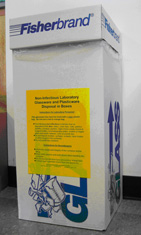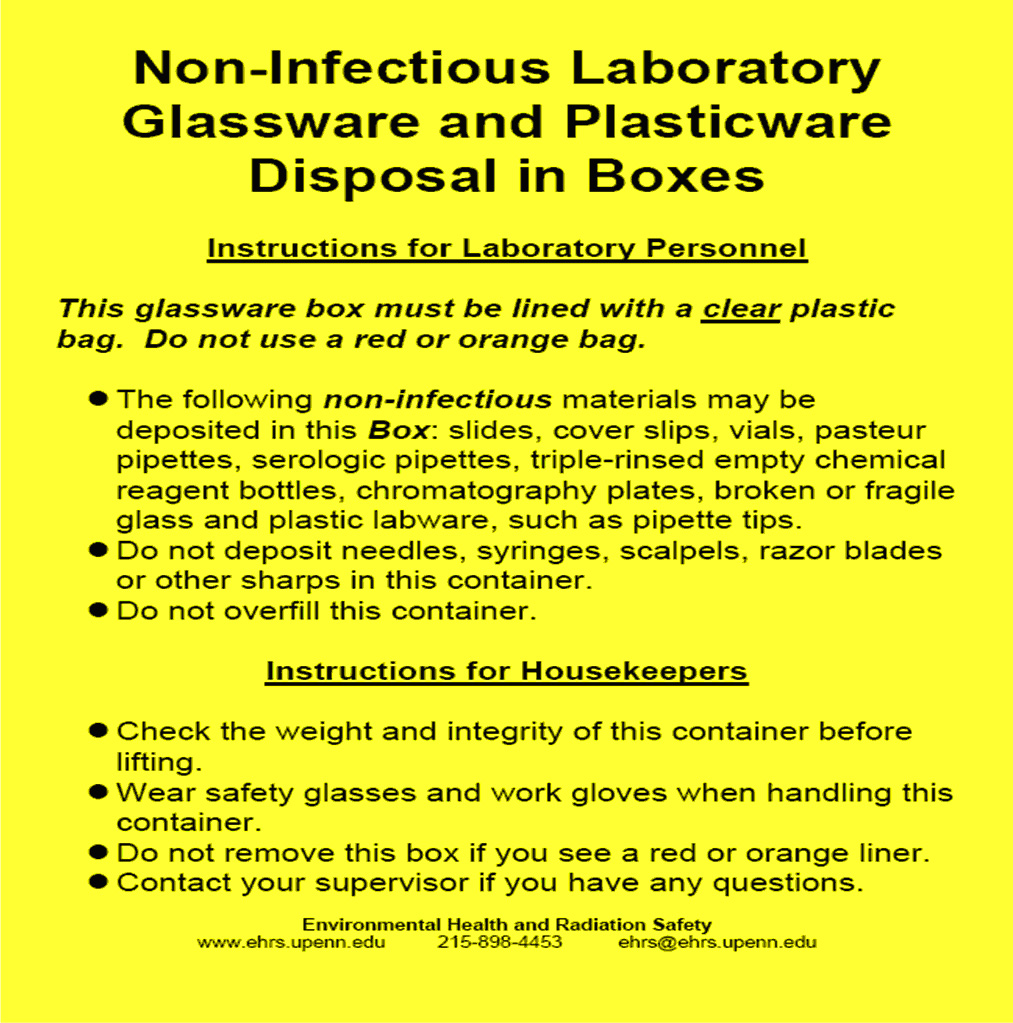Last Revised: February 12, 2025
This policy applies to the disposal of all laboratory glassware and plasticware at the University of Pennsylvania that has not come in contact with any infectious material. This policy does not apply to the disposal of laboratory sharps. (For information on the proper disposal of all sharps see Laboratory Sharps Waste).
Non-infectious Laboratory Glassware/Plasticware:
any item that is not a hypodermic needle, syringe (with or without the needle attached), razor, or scalpel and/or has not been in contact with infectious agents, or has not been used in animal or human patient care or treatment at a medical, research or industrial laboratories, or used with hazardous chemicals, but could potentially puncture a regular waste bag and pose a physical hazard to waste handlers. This includes but is not limited to glass slides, cover slips, glass vials, pasteur pipettes, plastic tips or serological pipets, empty (triple rinsed) chemical reagent bottles and broken or fragile glass or plastic. Nominal chemical contamination with non-P or U-listed waste is acceptable, as long as there is no accumulated liquid present.
Used Sharps: (25 Pa. Code § 271.1)
Broken glass, hypodermic needles, syringes to which a needle is or can be attached, razors, pasteur pipettes, scalpel blades, blood vials, needles with attached tubing, culture dishes, suture needles, slides, cover slips, and other broken or unbroken glass or plasticware that have been in contact with infectious agents or that have been used in animal or human patient care or treatment.
Infectious Waste Sharps:
items including but not limited to hypodermic needles, syringes (with or without the attached needle), blades, pasteur pipettes,plastic tips or serological pipets, blood vials, needles with attached tubing, culture dishes, suture needles, slides, cover slips and other broken or unbroken glass or plasticware that have been in contact with infectious agents or that have been used in animal or human patient care or treatment, at medical, research or industrial laboratories. Nominal chemical contamination with non-P or U-listed waste is acceptable, as long as there is no accumulated liquid present.
1. Dispose of non-infectious laboratory glassware/plasticware in the following containers Glass Disposal Box
- Laboratories are responsible to purchase boxes from laboratory supplies vendor.
- Boxes must be lined with clear heavy plastic bags, included with the box. (Infectious waste bags must NOT be used for lining.)
- Label box with "Non-Infectious Laboratory Glassware and Plasticware Disposal in Boxes" label available from EHRS or your building administrator.
- Glass Disposal Boxes


2. DO NOT use boxes for the disposal of infectious waste, used or unused needles, syringes, or blades!
3. DO NOT dispose of any of the following items in glassware/plasticware containers: (dispose in sharps container ONLY!)
- needles (including suture needles)
- syringes (with or without needles)
- needles from vacutainers
- needles with attached tubing
- ALL blades (razors, scalpels, X-acto, etc.)
4. Keep glassware/plasticware for disposal separate from all other waste in the laboratory. Laboratory glassware/plasticware is disposed of as regular trash. Items that meet the recycling requirements and are NOT biologically or chemically contaminated can also be recycled instead.
5. DO NOT dispose glassware/plasticware with chemical, infectious or radioactive contaminants in glassware/plasticware containers.
- Triple rinse and deface labels of empty chemical reagent bottles before discarding in laboratory glassware containers.
- Dispose of glassware/plasticware with infectious or radioactive contaminants appropriately.
6. When glassware/plasticware cardboard boxes are 2/3 full, close the lid and seal the top of the box with packaging tape.
- Place sealed box next to landfill waste trashcan for removal by housekeeping
- CHEMISTRY COMPLEX: Facilities staff removes the glasswaste boxes from lab floors

7. DO NOT overload glassware/plasticware disposal boxes. Housekeeping will not remove overloaded and/or heavy boxes.